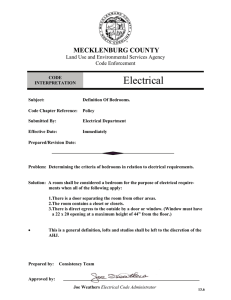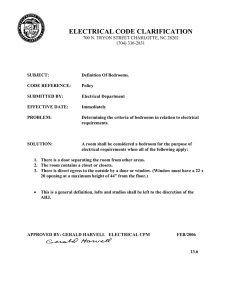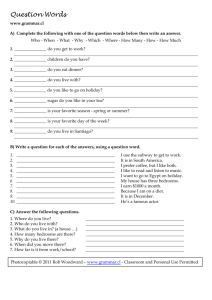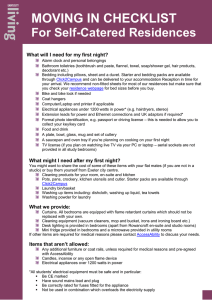Public perceptions of the Removal of the Spare Room Subsidy (RSRS)
advertisement
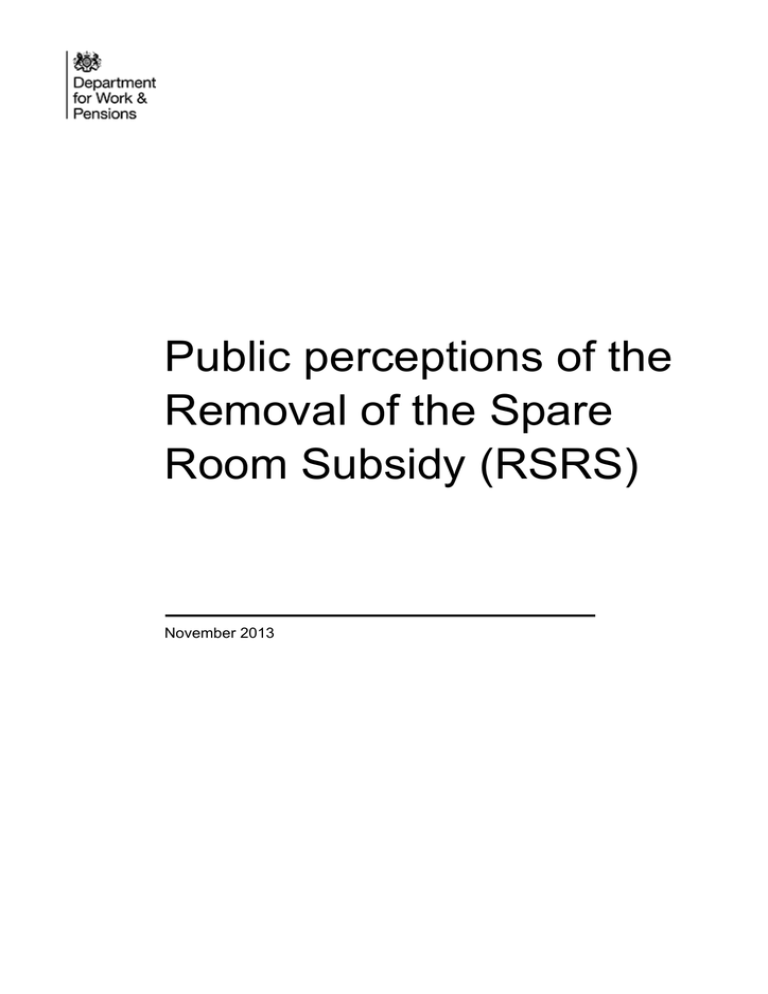
Public perceptions of the Removal of the Spare Room Subsidy (RSRS) November 2013 Public perceptions of the Removal of the Spare Room Subsidy (RSRS) A report of research carried out by the Department for Work and Pensions © Crown copyright 2013. You may re-use this information (not including logos) free of charge in any format or medium, under the terms of the Open Government Licence. To view this licence, visit http://www.nationalarchives.gov.uk/doc/open-government-licence/or write to the Information Policy Team, The National Archives, Kew, London TW9 4DU,or email: psi@nationalarchives.gsi.gov.uk. This document/publication is also available on our website at: https://www.gov.uk/government/organisations/department-for-work-pensions/series/inhouse-research-from-2011 If you would like to know more about DWP research, please email: Socialresearch@dwp.gsi.gov.uk First published 2013. ISBN 978-1-78153-817-3 Views expressed in this report are not necessarily those of the Department for Work and Pensions or any other Government Department. Public perceptions of the Removal of the Spare Room Subsidy (RSRS) Contents Background and Methodology .................................................................................... 3 Perceptions of the general public on RSRS................................................................ 5 Awareness of, and attitudes towards, benefit reform and the RSRS ..................... 5 Support for and opposition to RSRS...................................................................... 6 Impacts, fairness and responses ........................................................................... 8 Contacts ................................................................................................................... 10 Topline Data: Perceptions of the general public on RSRS ....................................... 11 Statistical reliability ................................................................................................... 22 Public perceptions of the Removal of the Spare Room Subsidy (RSRS) Background and Methodology From 1 April 2013, the Government reduced entitlement to Housing Benefit for working age tenants renting from a local authority, housing association or other registered social landlord who have more bedrooms than the Government thinks they need according to set criteria. Those with one extra bedroom will have a 14% reduction applied to their eligible rent and those with two or more extra bedrooms will have a 25% reduction applied. Working age tenants in social rented accommodation who claim Housing Benefit are allowed one bedroom for: - every adult couple (married or unmarried) any other adult aged 16 or over any two children of the same sex aged under 16 any two children aged under 10 any other child (other than a foster child or child whose main home is elsewhere) a carer (or team of carers) who does not live with the claimant but provides the claimant or their partner with overnight care. There are some easements: - - Foster carers are allowed one additional room, so long as they have fostered a child or become an approved foster carer within the last 52 weeks. Parents with adult children in the armed forces (or reservists) who normally live with them are able to retain the bedroom for that adult child when they are deployed on operations. The policy does not apply to those of pension age or to people living in certain supported exempt accommodation. The Department for Work and Pensions commissioned Ipsos MORI to conduct a survey to examine perceptions of the policy among the general public, following-up in more detail on data collected via a handful of questions included in a survey conducted in June largely focused on the benefit cap. 1 This publication presents 1 Public perceptions of the Benefit Cap and pre-implementation impacts, DWP, July 2013, available at https://www.gov.uk/government/publications/public-perceptions-of-the-benefit-cap-and-preimplementation-impacts 3 Public perceptions of the Removal of the Spare Room Subsidy (RSRS) findings from the survey and uses analysis prepared by Ipsos MORI, an independent research organisation operating under contract to DWP. To assess public attitudes to the Removal of the Spare Room Subsidy (RSRS), Ipsos MORI conducted a nationally representative online survey among 2,021 British adults aged between 16 and 75 and on the Ipsos Interactive Services panel. The i:omnibus survey is conducted weekly and generates a sample of c2,000 adults aged 16 to 75 across Great Britain. At the 95% confidence interval, a base of this size gives a sampling tolerance (or predicted range of responses) of no greater than +2%. Further information on statistical reliability can be found at the end of this document. The sample is built using Ipsos’ online panels based around a response rate of 30% to achieve the final sample of responses. The drawn sample closely mirrors the population on key demographics such as age, gender, work status and region. Data are weighted to be representative of Great Britain by key attributes including tenure, age, gender, region, social grade and work status. Fieldwork for the survey was conducted between Friday 23rd and Wednesday 28th August 2013 inclusive. 4 Public perceptions of the Removal of the Spare Room Subsidy (RSRS) Perceptions of the general public on RSRS The survey assessed people’s attitudes to RSRS in relation to a number of key themes including awareness of, and attitudes towards, benefit reform and RSRS, support for and opposition to the policy, and the impacts, fairness and responses to the policy among those affected. Awareness of, and attitudes towards, benefit reform and the RSRS By a margin of 3 to 1, the majority of the British public believe that the benefits system in Britain is too generous (52%) as opposed to not generous enough (17%). Around one in five (19%) say the system gets the balance about right. When asked about their awareness of changes to the payment of benefits, including how much people on benefits are paid, more than one third (36%) say they knew a great deal or fair amount about this before starting to complete the survey. A further 43% say they knew just a little, while around one in five (19%) say either that they had heard of this but know nothing about it, or had never heard of the changes. However, when asked how much they knew about RSRS after being prompted that they may know of the policy as ‘removal of the spare room subsidy, the bedroom tax or the size criteria’, a much greater proportion claim to know a great deal or fair amount. More than half (53%) say this, while 36% say they knew just a little. Just 7% say they had heard of RSRS but knew nothing about it. This means that, overall, 96% of the British public have at least heard of RSRS. 5 Public perceptions of the Removal of the Spare Room Subsidy (RSRS) Support for and opposition to RSRS In principle, there is more support than opposition for a reduction in the amount of Housing Benefit that those in both social and private-rented accommodation receive. For social tenants, 43% of the British public support a reduction in the amount of Housing Benefit paid, while 30% oppose any reduction. Similar proportions support and oppose a reduction in Housing Benefit for those in private-rented accommodation; 45% and 29% respectively. There is higher support in principle for a reduction in the amount of Housing Benefit paid to those of working age in social housing if they have more bedrooms than the Government thinks they need. Almost half (49%) support a reduction, in principle, on these terms. However, opposition also increases to one-third (33%) of the British public. There is higher support for a reduction by 25% for those judged by the Government to have two or more bedrooms than they need. Half (50%) support a reduction in Housing Benefit in this instance, compared to 45% support for a reduction in Housing Benefit by 14% for those with one more bedroom than the Government thinks they need. Conversely, a higher proportion oppose the reduction for those judged to be under-occupying by one bedroom than for those under-occupying by two or more bedrooms (34% vs. 30%). Respondents were asked whether they felt the level of reduction for those judged to be under-occupying was too high, too low, or about right. Results vary little between the 14% and 25% reduction levels for one and two bedrooms: 41% and 39% respectively feel that the reduction is about right for those judged to be underoccupying by one and two bedrooms. Some 30% and 29% believe the amount is too high for those judged to be under-occupying by one and two bedrooms respectively, while around one in ten (10% and 13% respectively) think it is too low. Respondents were presented with a more detailed description of the policy, who it applies to, who is entitled to easements, and how many people are affected (according to the DWP’s own estimates). On this measure, there is plurality support for the policy: 44% support RSRS with a reduction of 14% for one extra bedroom, with 31% opposed. For the reduction of 25% for those with two or more extra bedrooms, 46% support the policy with 29% opposed. 6 Public perceptions of the Removal of the Spare Room Subsidy (RSRS) While more of the public support than oppose the policy following more detailed description, attitudes towards it are polarised, with equally strong support and opposition. Almost one third have a strong opinion on RSRS: 16% say they strongly support it, while 16% strongly oppose it. 7 Public perceptions of the Removal of the Spare Room Subsidy (RSRS) Impacts, fairness and responses Having measured support/opposition for the policy in principle and again after a more detailed description, the survey moved on to ask about some of the potential impacts of RSRS in order to better understand the nature of public support and opposition. A much higher proportion of the British public support the policy if it reduces the total amount the Government spends on benefits (54% support, 20% oppose). The public are similarly positive if RSRS encourages those affected to take up employment (52% support, 20% oppose), while twice as many support the policy than oppose it if it means those affected have to move to find more affordable accommodation in the same area (49% support, 24% oppose). However, more people oppose RSRS than support it if it means that those affected have less income to cover living costs (31% support, 35% oppose), and opposition grows further if RSRS means that those affected have to move to find more affordable accommodation in a different area (31% support, 40% oppose). Twice as many agree than disagree that it is fair that people of working age and living in social housing who have more bedrooms than they need should receive less Housing Benefit. More than half (54%) strongly or tend to agree it is fair (21% agree strongly), while 27% disagree. Respondents were subsequently given a number of statements about the fairness or unfairness of the possible impacts of the policy. Broadly speaking, the British public see both fairness and unfairness in the policy. The majority of the public agree that RSRS is fair because the same rules apply to those claiming Housing Benefit who rent from private landlords (55% agree, 16% disagree), and because others in social rented accommodation have fewer bedrooms than they need (54% agree, 16% disagree). Similarly, the majority agree that the RSRS will encourage those with less Housing Benefit to improve their personal situation by, for example, finding work (54% agree, 20% disagree). However, the majority also agree that RSRS is unfair if there is a shortage of properties with fewer bedrooms in the same area (54% agree, 18% disagree). In addition, more agree than disagree that RSRS is unfair if those affected have to make up for the reduction in Housing Benefit by spending less on household 8 Public perceptions of the Removal of the Spare Room Subsidy (RSRS) essentials (48% agree, 21% disagree). A plurality also consider the policy unfair because it does not tackle the reasons why people need Housing Benefit in the first place (43% agree, 27% disagree) and because it is unfair on those living in high-cost housing areas (40% agree, 25% disagree). Respondents were then given a series of possible actions that those affected by RSRS might take in order to deal with the reduction in income, and asked whether they thought that households should or should not be prepared to take those actions. The majority believe that those affected should be prepared to move to a property with fewer bedrooms in the same area (68% should, 17% should not), find new or alternative work or work more hours (60% should, 17% should not) or find ways of reducing their living costs and bills (61% should, 22% should not). However, the British public do not, on balance, believe those affected should be prepared to move to a property in the private rented sector (33% should, 35% should not) having been told earlier that similar rules apply to that sector. They also, on balance, do not think those affected should take in a lodger so they no longer have fewer bedrooms than they need (34% should, 42% should not) or move to a property with fewer bedrooms even if this means moving to a new area (34% should, 43% should not). The British public overwhelmingly feel that reducing levels of under-occupation and overcrowding in social housing is important. Almost four in five (78%) believe doing so is either ‘very important’ or ‘fairly important’, compared with 14% who think it is ‘not very important’ or ‘not at all important’. However, respondents are less sure about the extent to which RSRS will result in a more efficient use of social housing: 47% say the extent to which RSRS will result in social stock being used more efficiently is ‘a great deal’ or ‘fair amount’, while 41% think the extent to which this happens will be ‘not very much’ or ‘not at all’. There are mixed views about the extent to which different groups are responsible for ensuring that those affected by RSRS have accommodation of an appropriate size in terms of the number of bedrooms. Seven in ten respondents (70%) believe that local government has ‘a great deal’ or ‘fair amount’ of responsibility. This compares to a slightly lower proportion for Central Government (61%), affected households (60%) and Landlords (59% - whether Local Authorities or Housing Associations). 9 Public perceptions of the Removal of the Spare Room Subsidy (RSRS) Contacts Press enquiries should be directed to the Department for Work and Pensions press office. Media enquiries: 0203 267 5129 Out of hours: 0203 267 5144 Website: www.gov.uk/dwp Follow us on Twitter: www.twitter.com/dwppressoffice 10 Public perceptions of the Removal of the Spare Room Subsidy (RSRS) Topline Data: Perceptions of the general public on RSRS Ipsos MORI interviewed a sample of 2,021 members of the British public aged between 16 and 75 from the Ipsos Interactive Services panel. Interviews were carried out online. Fieldwork was conducted between 23 and 28 August 2013. Results are based on all respondents unless otherwise stated. Data is weighted and is representative of the GB profile by tenure, age, gender, region, social grade, working status and main shopper in the household. An asterisk (*) denotes a finding of less than 0.5%, but greater than zero. Where results do not sum to 100 this may be due to multiple responses or computer rounding. RS1. Generally speaking, do you think the benefits system in Britain is too generous, not generous enough or gets the balance about right? Base: All respondents % Too generous 52 Is not generous enough 17 Gets the balance about right 19 Don’t know 12 11 Public perceptions of the Removal of the Spare Room Subsidy (RSRS) RS2. As you may know, the Government is introducing changes to the payment of benefits including how much people on benefits are paid. How much, if anything, would you say you know about these changes? Base: All respondents % A great deal 8 A fair amount 28 Just a little 43 Heard of, know nothing about 16 Never heard of 3 Don’t know 2 RS3. Housing Benefit is paid to those people living in private rented accommodation or in social housing (renting from a council or housing association) who have low incomes and need help with the cost of their rent. People have to apply for Housing Benefit and their need is assessed by local councils. In principle do you support or oppose the Government reducing the amount of Housing Benefit that the following groups get… Base: All respondents % % …those living in social housing (renting from a council or housing association)? …those living in accommodation rented from a private landlord? Strongly support 17 19 Tend to support 26 26 Neither support nor oppose 21 20 Tend to oppose 16 16 Strongly oppose 14 12 Don’t know 6 6 12 Public perceptions of the Removal of the Spare Room Subsidy (RSRS) RS4. As you may know, from 1 April this year the Government changed Housing Benefit rules so that those of working age and living in social housing only receive benefit for the size of property that the Government thinks they need – for example, a couple with no children would have their benefits reduced if they had more than one bedroom. You may know of this as removal of the spare room subsidy, the bedroom tax or the size criteria. Before starting to complete this survey how much, if anything, did you know about this change? Base: All respondents % A great deal 15 A fair amount 38 Just a little 36 Heard of, know nothing about 7 Never heard of 2 Don’t know 1 RS5. In principle, do you support or oppose the reduction in the amount of Housing Benefit for those of working age and living in social housing (rented from a council or housing association) if they have more bedrooms than the Government thinks they need? Base: All respondents % Strongly support 18 Tend to support 31 Neither support nor oppose 15 Tend to oppose 16 Strongly oppose 17 Don’t know 3 13 Public perceptions of the Removal of the Spare Room Subsidy (RSRS) RS6. People of working age on Housing Benefit who live in social housing and have more bedrooms than the Government thinks they need (i.e. under occupy their home) now receive less Housing Benefit. Do you support or oppose the reduction by... Base: All respondents % % …14% (or on average £12 per week) for those who have ONE bedroom more than the Government thinks they need? …25% (or on average £22 per week) for those who have at least TWO bedrooms more than the Government thinks they need? Strongly support 18 22 Tend to support 27 27 Neither support nor oppose 15 14 Tend to oppose 16 14 Strongly oppose 18 16 Don’t know 6 6 14 Public perceptions of the Removal of the Spare Room Subsidy (RSRS) RS7. Do you think the reduction in the amount of Housing Benefit for those of working age and living in social housing who have more bedrooms than the Government thinks they need is too high, too low or about right for each of the following… Base: All respondents % % …14% (or on average £12 per week) for those who have ONE bedroom more than the Government thinks they need? …25% (or on average £22 per week) for those who have at least TWO bedrooms more than the Government thinks they need? Reduction too high 30 29 Reduction about right 41 39 Reduction too low 10 13 Don’t know 19 18 15 Public perceptions of the Removal of the Spare Room Subsidy (RSRS) RS8. From 1 April this year the Government reduced the amount of Housing Benefit that those of working age and living in social housing receive if they have more bedrooms than the Government thinks they need. This depends on how many children they have, their age and their sex. It is estimated by the Government that 660,000 households are affected. There are some exemptions for those of pension age and for people living in certain supported exempt accommodation. In addition extra rooms are allowed for an overnight carer, foster carers, disabled children who are unable to share a bedroom and the parents of serving members of the Armed Forces whilst their children are deployed on duty. Similar measures already apply for those renting from private landlords, where the amount of Housing Benefit they are entitled to is based on the number, age and sex of people in the household. With this in mind, do you support or oppose the reduction in the amount of Housing Benefit for those of working age and living in social housing by.. Base: All respondents % % …14% (or on average £12 per week) for those who have ONE bedroom more than the Government thinks they need? …25% (or on average £22 per week) for those who have at least TWO bedrooms more than the Government thinks they need? Strongly support 16 19 Tend to support 28 28 Neither support nor oppose 14 14 Tend to oppose 14 13 Strongly oppose 16 15 Don’t know 11 11 16 Public perceptions of the Removal of the Spare Room Subsidy (RSRS) RS9. To what extent do you support or oppose the reduction in Housing Benefit by between £12 and £22 per week (on average, depending on the number of extra bedrooms), for those of working age and living in social housing if they have more bedrooms than they need if…? Base: All respondents % % % % % …it reduces the total amount the Government spent on benefits? …it means that those Housing Benefit claimants affected by the reduction had less income to cover living costs and bills? …it means that those Housing Benefit claimants affected by the reduction had to move to alternative accommodation in the same area to find more affordable accommodation? …it means that those Housing Benefit claimants affected by the reduction had to move to alternative accommodation in a different area to find more affordable accommodation? …it means that those Housing Benefit claimants affected by the reduction are encouraged to take up new employment or increase their earnings e.g. through working additional hours? Strongly support 26 11 18 11 25 Tend to support 28 20 31 19 27 Neither support nor oppose 17 24 17 20 18 Tend to oppose 9 17 11 19 8 Strongly oppose 11 18 13 21 12 Don’t know 10 10 10 10 9 17 Public perceptions of the Removal of the Spare Room Subsidy (RSRS) RS10. To what extent do you agree or disagree that it is FAIR that people of working age and living in social housing who have more bedrooms than they need should receive less Housing Benefit? Base: All respondents % Strongly agree 21 Tend to agree 33 Neither agree nor disagree 16 Tend to disagree 14 Strongly disagree 13 Don’t know 3 RS11. To what extent do you agree or disagree with these statements about the possible impacts of reducing Housing Benefit? Reducing Housing Benefit by between £12 and £22 per week (on average, depending on the number of extra bedrooms) to those of working age and living in social housing who have more bedrooms than they need… Base: All respondents % % % …is fair because other people are living in social rented properties where they have fewer bedrooms than they need … is fair, because the same rules apply to those who rent from private landlords and claim Housing Benefit will encourage those whose benefit is reduced to improve their personal situation by, for example, finding work Strongly agree 20 21 26 Tend to agree 33 34 29 Neither agree nor disagree 22 20 17 Tend to disagree 9 8 11 Strongly disagree 7 8 9 Don’t know 8 9 8 18 Public perceptions of the Removal of the Spare Room Subsidy (RSRS) % % % % ….is unfair on those Housing Benefit claimants living in areas where housing costs are high …is unfair because it does not tackle the main reasons why people need Housing Benefit in the first place …is unfair if there is a shortage of properties with fewer bedrooms in the same area ...is unfair if those affected reduce their spending on essentials like food and energy to make up for the reduction in Housing Benefit Strongly agree 16 22 26 23 Tend to agree 24 21 28 26 Neither agree nor disagree 27 23 21 24 Tend to disagree 16 17 10 13 Strongly disagree 9 10 7 7 Don’t know 8 8 8 8 RS12. For each of these please indicate whether you think households of working age and living in social housing whose Housing Benefit has been reduced because they have more bedrooms than they need should or should not be prepared to… Base: All respondents % % % % % % …move to a property with fewer bedrooms in the same area …move to a property with fewer bedrooms even if this means moving to a new area …move to a property in the private rented sector …take in a lodger(s) so they no longer have fewer bedrooms than they need …find ways of reducing their living costs and bills Should 68 34 33 34 61 60 Should not 17 43 35 42 22 17 Don’t know 15 23 31 25 18 22 …find new or alternative work or work more hours 19 Public perceptions of the Removal of the Spare Room Subsidy (RSRS) RS13. To what extent, if at all, do you think the following groups are responsible for ensuring that working age households living in social housing whose Housing Benefit has been reduced because they have more bedrooms than they need have accommodation of the correct size in terms of the number of bedrooms? Base: All respondents % % % % % The household whose benefit has been reduced The landlord (Council or Housing Association) Central Government Local Government Someone else A great deal 28 27 31 36 2 A fair amount 32 32 29 34 6 Not very much 13 14 14 8 11 Not at all 8 8 7 5 24 Don’t know 19 19 18 18 56 RS14. How important, if at all, do you think it is to reduce levels of under-occupation (people in property with more bedrooms than they need) and overcrowding (people in property with less bedrooms than they need) within the social housing stock if it means that social housing is used more efficiently? Base: All respondents % Very important 35 Fairly important 43 Not very important 10 Not at all important 4 Don’t know 9 20 Public perceptions of the Removal of the Spare Room Subsidy (RSRS) RS15. To what extent do you think the reduction in the amount of Housing Benefit for those of working age and living in social housing who have more bedrooms than they need will result in a more efficient use of social housing by reducing levels of under-occupation and overcrowding? Base: All respondents % A great deal 14 A fair amount 33 Not very much 28 Not at all 12 Don’t know 12 21 Public perceptions of the Removal of the Spare Room Subsidy (RSRS) Statistical reliability The respondents who took part in the survey are only a sample of the total "population" of Great Britain. Therefore we cannot be certain that the figures obtained are exactly those we would have if everybody had responded (the "true" values). We can, however, predict the variation between the sample results and the "true" values from knowledge of the size of the samples on which the results are based and the number of times a particular answer is given. The confidence with which we can make this prediction is usually chosen to be 95 per cent - that is, the chances are 95 in 100 that the "true" value will fall within a specified range. The table below illustrates the predicted ranges for different sample sizes and percentage results at the "95 per cent confidence interval": Size of sample on which survey result is based 100 responses 200 responses 500 responses 1,000 responses 2,021 responses Approximate sampling tolerances applicable to percentages at or near these levels 10% or 90% 30% or 70% 50% + + + 6 9 10 4 6 7 3 4 4 2 3 3 1 2 2 For example, with a sample size of 2,021 where 30 per cent give a particular answer, the chances are, 19 in 20, the "true" value (which would have been obtained if the whole population had been interviewed) will fall within the range of ±2 percentage points from the survey result (i.e. between 28% and 32%). When results are compared between separate groups within a sample, different results may be obtained. The difference may be "real," or it may occur by chance (because not everyone in the population has been surveyed). To test if the difference is a real one, i.e. if it is "statistically significant", we again have to know the size of the samples, the percentage giving a certain answer and the degree of confidence chosen. If we assume "95 per cent confidence interval", the differences between the results of two separate groups must be greater than the values given in the table below: 22 Public perceptions of the Removal of the Spare Room Subsidy (RSRS) Size of samples compared 100 and 100 200 and 200 500 and 500 500 and 1,000 1,000 and 1,000 Differences required for significance at or near these percentage levels 10% or 90% 30% or 70% 50% + + + 8 13 14 6 9 10 4 6 6 3 5 5 3 4 4 23


